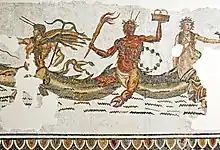Phorcys
In Greek mythology, Phorcys or Phorcus (/ˈfɔːrsɪs/; Ancient Greek: Φόρκυς, romanized: Phórkus) is a primordial sea god, generally cited (first in Hesiod) as the son of Pontus and Gaia (Earth). According to the Orphic hymns, Phorcys, Cronus and Rhea were the eldest offspring of Oceanus and Tethys.[1][2] Classical scholar Karl Kerenyi conflated Phorcys with the similar sea gods Nereus and Proteus.[3] His wife was Ceto, and he is most notable in myth for fathering by Ceto a host of monstrous children. In extant Hellenistic-Roman mosaics, Phorcys was depicted as a fish-tailed merman with crab-claw forelegs and red, spiky skin.
| Phorcys | |
|---|---|
 | |
| Abode | Sea |
| Personal information | |
| Parents | Pontus and Gaea |
| Siblings | Nereus, Thaumas, Ceto and Eurybia |
| Consort | Ceto |
| Children | The Hesperides, the Gorgons, the Graeae, Thoosa, Scylla, Echidna, the Sirens, and Ladon |
| Greek deities series |
|---|
| Aquatic deities |
Offspring
Hesiod's Theogony lists the children of Phorcys and Ceto as the Graeae (naming only two: Pemphredo, and Enyo), the Gorgons (Stheno, Euryale and Medusa),[4] probably Echidna (though the text is unclear on this point)[5] and Ceto's "youngest, the awful snake who guards the apples all of gold in the secret places of the dark earth at its great bounds",[6] also called the Drakon Hesperios ("Hesperian Dragon", or dragon of the Hesperides) or Ladon. These children tend to be consistent across sources, though Ladon is often cited as a child of Echidna by Typhon and therefore Phorcys and Ceto's grandson.[7]
According to Apollodorus, Scylla was the daughter of Crataeis, with the father being either Trienus (Triton?) or Phorcus (a variant of Phorkys).[8] Apollonius of Rhodes has Scylla as the daughter of Phorcys and a conflated Crataeis-Hecate.
The Scholiast on Apollonius of Rhodes cites Phorcys and Ceto as the parents of the Hesperides, but this assertion is not repeated in other ancient sources.
Homer refers to Thoosa, the mother of Polyphemus, as a daughter of Phorcys, with no mother specified.
Genealogy
Notes
- Kerenyi, p. 42.
- Plato. Timaeus 40e. Translated by W.R.M. Lamb. Cambridge, MA, Harvard University Press; London, William Heinemann Ltd. 1925.
- Kerenyi pp. 42–43.
- Hesiod, Theogony, 270–276.
- Hesiod, Theogony, 295–297. Though Herbert Jennings Rose says simply that it is "not clear which parents are meant", Athanassakis, p. 44, says that Phorcys and Ceto are the "more likely candidates for parents of this hideous creature who proceeded to give birth to a series of monsters and scourges". The problem arises from the ambiguous referent of the pronoun "she" in line 295 of the Theogony. While some have read this "she" as referring to Callirhoe (e.g. Smith "Echidna"; Morford, p. 162), according to Clay, p. 159 n. 32, "the modern scholarly consensus" reads Ceto, see for example Gantz, p. 22; Caldwell, pp. 7, 46 295–303; Grimal, "Echidna" p. 143.
- Hesiod, Theogony, 333–335.
- Pherecydes, fr. 16b Fowler; Apollodorus, Library 2.5.11; Hyginus, Fabulae Preface, 151.
- Apollodorus, E7.20. Similarly the Plato scholiast, perhaps following Apollodorus, gives the mother as Crataeis and the father as Tyrrhenus or Phorcus, while Eustathius on Homer, Odyssey 12.85 gives the father as Triton. Homer, Odyssey 12.124–125; Ovid, Metamorphoses 13.749, have Crataeis as mother with no father mentioned; see also Servius on Virgil Aeneid 3.420; and schol. on Plato, Republic 588c. For discussions of the parentage of Scylla, see Fowler 2013, p. 32, Ogden, p. 134; Gantz, pp. 731–732; and Frazer's note to Apollodorus, E7.20.
- There are two major conflicting stories for Aphrodite's origins: Hesiod (Theogony) claims that she was "born" from the foam of the sea after Cronus castrated Uranus, thus making her Uranus' daughter; but Homer (Iliad, book V) has Aphrodite as daughter of Zeus and Dione. According to Plato (Symposium 180e), the two were entirely separate entities: Aphrodite Ourania and Aphrodite Pandemos.
- Most sources describe Medusa as the daughter of Phorcys and Ceto, though the author Hyginus (Fabulae Preface) makes Medusa the daughter of Gorgon and Ceto.
References
- Apollodorus, Apollodorus, The Library, with an English Translation by Sir James George Frazer, F.B.A., F.R.S. in 2 Volumes. Cambridge, MA, Harvard University Press; London, William Heinemann Ltd. 1921. Online version at the Perseus Digital Library.
- Athanassakis, Apostolos N, Hesiod: Theogony, Works and days, Shield, JHU Press, 2004. ISBN 978-0-8018-7984-5.
- Caldwell, Richard, Hesiod's Theogony, Focus Publishing/R. Pullins Company (June 1, 1987). ISBN 978-0-941051-00-2.
- Clay, Jenny Strauss, Hesiod's Cosmos, Cambridge University Press, 2003. ISBN 978-0-521-82392-0.
- Fowler, R. L. (2000), Early Greek Mythography: Volume 1: Text and Introduction, Oxford University Press, 2000. ISBN 978-0198147404.
- Fowler, R. L. (2013), Early Greek Mythography: Volume 2: Commentary, Oxford University Press, 2013. ISBN 978-0198147411.
- Freeman, Kathleen, Ancilla to the Pre-Socratic Philosophers: A Complete Translation of the Fragments in Diels, Fragmente Der Vorsokratiker, Harvard University Press, 1983. ISBN 9780674035010.
- Gantz, Timothy, Early Greek Myth: A Guide to Literary and Artistic Sources, Johns Hopkins University Press, 1996, Two volumes: ISBN 978-0-8018-5360-9 (Vol. 1), ISBN 978-0-8018-5362-3 (Vol. 2).
- Grimal, Pierre, The Dictionary of Classical Mythology, Wiley-Blackwell, 1996, ISBN 978-0-631-20102-1. "Echidna" p. 143.
- Hyginus, Gaius Julius, The Myths of Hyginus. Edited and translated by Mary A. Grant, Lawrence: University of Kansas Press, 1960.
- Kerenyi, Karl 1951 (1980). The Gods of the Greeks.
- Morford, Mark P. O., Robert J. Lenardon, Classical Mythology, Eighth Edition, Oxford University Press, 2007. ISBN 978-0-19-530805-1.
- Rose, Herbert Jennings, "Echidna" in The Oxford Classical Dictionary, Hammond and Scullard (editors), Second Edition, Oxford University Press, 1992. ISBN 0-19-869117-3
- Smith, William; Dictionary of Greek and Roman Biography and Mythology, London (1873).